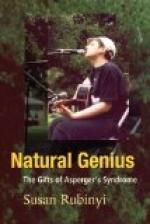A bird with pinions beautiful,
and shy,
May sing scarce
noted mid the noisier throng;
Or ’scaping earth, take
refuge in the sky
And though concealed
still charm the air with song.
Yet haply some enamored ear
may hark,
And deem it sweetest
of the birds that sing;
Or in his heart still praise
the unseen lark
That leads his
fancies toward its heavenward wing.
A star in some sequestered
nook on high,
In its deep niche
of blue may calmly shine,
While careless eyes that wander
o’er the sky,
May only deem
the brightest orbs divine.
But there are those who love
to sit and trace
Between all these
some shy retiring light,
For such, they know, shed
through the veil of space
The general halo
that adorns the night.
Thus many a poet’s volume
unproclaimed
By all the myriad
tongues of Fame afar,
The few may deem as worthy
to be named,
(As I do this)
a Flower, a Bird, a Star!
THE PRINCE AT LAND’S END.
BY CAROLINE CHESEBRO.
Last from the church came the organist, Daniel Summerman. He was less hurried than others; to him it was not, as to people in general, a day of increased social responsibility. His great duty was now performed. Done, whether well or ill. He descended the stairs slowly, but with a step so light you might have taken it for a child’s. No need for him to haste; the precious moments would go fast enough—he wished not to lose one.
In the porch he paused a moment, to draw on his woollen gloves, and button his great coat, and for something besides. Perhaps the person who laid the wreath of cedar leaves on his organ stool was somewhere about, and had some criticism to offer in respect to the choir’s performance.
But he descended the church steps without having met even the sexton; somewhat disappointed, it was not with indifference that he saw a stranger standing in the churchyard among the graves; by the grave, it chanced, of a child who died in October, five years old. When the organist perceived this, a purpose which he would have formed later in the day, anticipated itself, and led him to the little mound. He would leave the cedar wreath on Mary’s grave.
He was not ashamed of his gracious purpose when he had drawn near. His gentle heart was glad to do this homage to the dead, in the presence of a stranger who had never seen the living child. Stooping down, he smoothed the frozen grass, and laid the wreath upon it; and when he saw the stranger watching him, he said:
“She was the prettiest child in the village; if she had lived, we should have had one singer in the choir. I would have taught her. She loved music so much.”
Here was an introduction sufficient for an ordinary man. At least the organist thought so. But when he looked at the stranger he was sorry that he had spoken, for no genial sympathy was in that face, and still less in the voice that asked,




